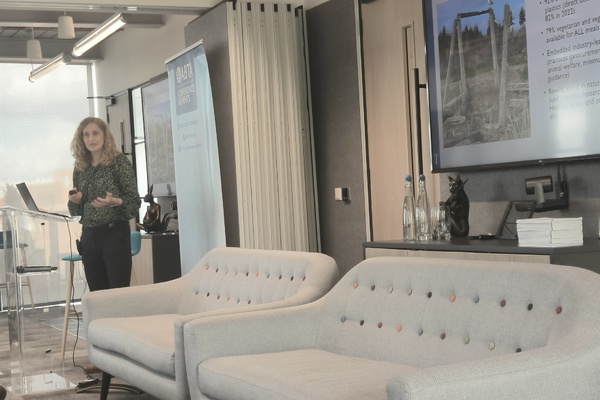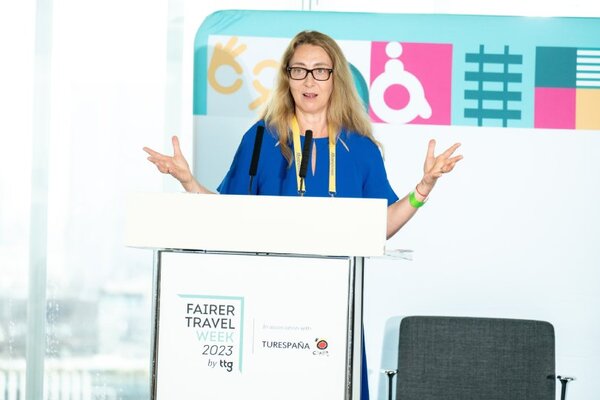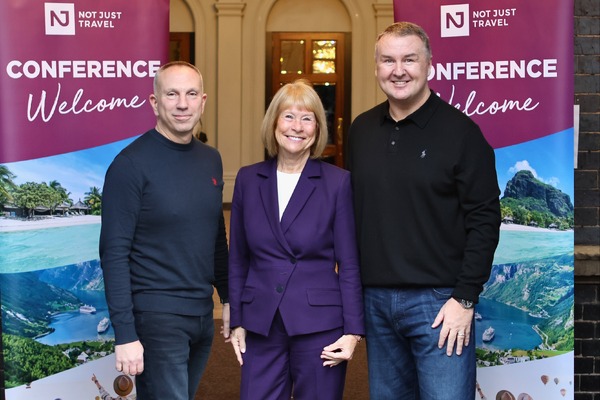Eight takeaways from Abta’s Delivering Sustainable Travel Conference
At a day-long conference held by Abta in London, representatives from the industry gathered to share learnings, opportunities and challenges when it comes to promoting and acting on delivering sustainable, responsible travel.
Key themes at the Delivering Sustainable Travel Conference on Wednesday 15 May included the options – and challenges – for tackling overtourism, the need for collaboration across the industry and the consumer “say do” gap which touched on talk over action when it comes to travelling sustainably – with the responsibility for ensuring responsible travel firmly held at the industry’s door.
Put aside the quest for perfection
In her keynote address Hotelplan director of sustainability Prue Stone urged delegates to put aside the “quest” for perfection and acknowledge the travel industry’s role as one of “problem solving”.
“In this industry we’re nothing but problem solvers. We deal with operational changes, passenger demand shifts, geopolitical shifts, environmental catastrophes – I think between us we’ve probably done it all. And how have we always done it? By working together.”
Stone pointed out that the industry often having to be reactionary, with tight deadlines, means solutions are probably not perfect. “As humans we are always going to make mistakes, so it’s that opportunity to put aside the quest for perfection and a fear of failure, as I think that hampers your progress.”
“I would urge people to reimagine travel – reimagine an alternative collectively and implement it imperfectly,” Stone said.
Regulation can’t lead to greenhushing
In the opening panel, Travalyst head of communications Natalie Allard highlighted regulation as a key focus for the coalition, but insisted the scrutiny that comes with regulation cannot lead to “greenhushing” within travel.
“Sustainability used to be niche but now everyone is talking about it and that’s a really good thing, but it means a lot of noise and with noise comes scrutiny,” Allard noted.
“You can’t just say something is sustainable or green or eco-friendly; you have to really back it up. That’s a good thing because consumers are going to be armed with really credible information, but we don’t want regulation that’s [intended to] combat greenwashing to lead to greenhushing."
Allard stressed: “We don’t want to be in the space where people are too scared to talk about the good things they are doing, because that will lead to a vacuum of information, and if information isn’t there, how will consumers make better choices?”
Should we talking about ‘travelling sustainably’ to consumers?
TTG Media CEO Daniel Pearce posed the question of whether the travel industry should be talking about ’travelling sustainably’ to would-be holidaymakers.
Pearce said: “There’s a challenge to get consumers more excited about travelling sustainably – and we probably shouldn’t call it ‘travelling sustainably’ because for many that’s a switch off and we need to recognise that."
He added: “Travel agents tell us they very rarely see people that have any interest in sustainable travel or ask those questions at the point of purchase. There’s a gap between what the industry is telling themselves and what consumers are responding to, and I think there’s a massive marketing challenge to get consumers more excited and onboard.”
The panel was questioned on how to make carbon reporting, emissions figures and other sustainably metrics that the industry holds itself up to more relevant to consumers.
Allard responded: “We need to make our messages land so they make more sense to the average person that might not live and breathe sustainability every day.”

She cited Travalyst partner Google as an example of good practice. “When you see the emissions information there, they compare it to how many hamburgers that is or how many cars are taken off the road.”
It’s all about collaboration
Allard called for more collaboration as part of her wish list for the next year. “There’s no point in weaponising sustainability – it’s then just a race to the bottom. We’re on this journey together: how can we help each other?”
Stone also firmly stated one person alone in a business can’t be the driver for change.“It’s not any one person’s job to envisage that change and drive it through a business…it’s exhausting.
“To get from where we are today to where we need to get to requires change from the top down, bottom up, every corner of all of our networks, finding solutions together. For people to be onboard with change, they need to be part of the process.”
One size does not fit all
Addressing the question of water scarcity in destinations, The Travel Foundation sustainable tourism specialist Rebecca Armstrong highlighted the issue as becoming “more acute with the climate impact, and peak demand in destinations often being at the hottest, driest times of the year”.
“It results in that perfect storm of impacts at destination level, and residents are understandably responding to that – water is a basic human right. I think it’s essential for tour operators to work with destinations and collaborate at that level to understand those challenges. It’s not a one-size-fits-all approach – those challenges will be local and very specific.”
The “one size does not fit all” message was a recurring recognition across the conference, which regularly returned to the enormity of the task within the travel industry to keep moving forward with responsible travel initiatives.
Consumers see sustainable travel as the industry’s responsibility
Conference host Susan Deer, Abta’s director of industry relations, noted the “say do” gap in terms of consumers saying they intend to make a choice about their holiday with sustainability in mind, but not always following through.
Deer went one step further, noting the expectation from consumers that “it’s for us to do this stuff, and the conversations we should be having with [consumers] are about having a brilliant holiday”.
Rochelle Turner, Exodus Adventure Travel’s head of sustainability, when discussing the long-term impact of biodiversity loss, candidly displayed to delegates a series of reviews from customers that appeared to attribute disappointing levels of rubbish on trips to the operator itself.
“We try as best we can not to have plastics on our trips, but the people we are travelling with are seeing it all around them. We are not contributing to it ourselves but people see it and attribute, saying ‘what are you doing, Exodus, to make these destinations better, cleaner, more healthy?’”
Biodiversity loss is critical to address, Turner added. “We’ve lost it from our terrestrial eco-systems, our ocean floors and in our species. This cannot continue because the long-term attractiveness of our destinations is really at threat. It affects our business reputation.”
We need everyone around the table – especially local communities – when looking at overtourism
Overtourism was discussed in depth across an industry panel comprising Sandra Ishmael, director UK at Netherlands Board of Tourism & Conventions; Nadine Pinto, global sustainability manager, The Travel Corporation; and Tui’s head of sustainability Ian Corbett.
Pinto said: “What we’re seeing is when you poorly manage tourism, it’s worse than no tourism. It’s about bringing everyone who’s part of the tourism industry together to talk about how we can ensure the destination is sustainable in the future.”
Ishmael asserted: “It’s easy to look from the outside and say a destination is failing, but I think we really need to be on the ground to understand the challenges in a certain region or city.”
Addressing the protests in the Canary Islands, Corbett said: “If there’s a failure, there’s a failure in the fact they felt their voices weren’t being heard. There’s a need to broaden and move the debate beyond ‘tourism is here to stay’. We’ve got loads to debate around what growth looks like from a carbon and social perspective.
“There’s no simple solution to complex problems – it’s understanding our guests are guests, we’re also guests and investors are guests. It’s the people in the communities we have to put first and work out what’s best for them, and then build a tourism model around that.”
Pinto called for transparency around destinations’ entry fees in terms of where money is being spent. “I would call on destinations to say, ‘let’s see a year from now what you’re doing with the money, be transparent about those funds.’”
All agreed getting “everyone around the table” when it comes to a destination was vital – from tour operators, hoteliers and tourism representatives to the local communities themselves – with Ishmael pointing out the need to address the benefit of tourism, as well as the challenges.
The benefits of industry certification – but a recognition of the resource involved
Inside Travel Group’s global head of sustainability, Sophie Walker, pointed to the benefits of certification in the industry, such as Travelife and B Corp, which Inside Travel achieved in May 2023.
“It’s being part of a movement, which is really exciting. In the UK, we’ve got the Travel by B Corp movement. It means all that talk about collaboration – it can be done, as we’ve now got this sharing platform where we can work together to implement change.
“We are putting a lot of time and resources into certification but I feel like the benefits pay off,” Walker stressed, highlighting the breadth of certification available to industry.
Pearce detailed TTG Media’s motivation for starting the journey to B Corp: “B Corp Certification was an obvious route for us to go down and it did push us to becoming a better business. I’m seeing now that it helps with recruitment into roles – particularly among the Gen Z population.”
He added: “We should be moving to a position where we’re happy to be audited for our sustainable credentials – I’d like to see more concrete movement towards this.”
Be inspired to take the next steps in your sustainability journey
Join us for a full day packed with practical advice and honest case studies, designed to help you make a real difference to your business’s sustainability strategy and create a fairer industry for customers, staff and the destinations you operate in.
Sign up for weekday travel news and analysis straight to your inbox

Sarah Dennis
Supplier Directory
Find contacts for 260+ travel suppliers. Type name, company or destination.















